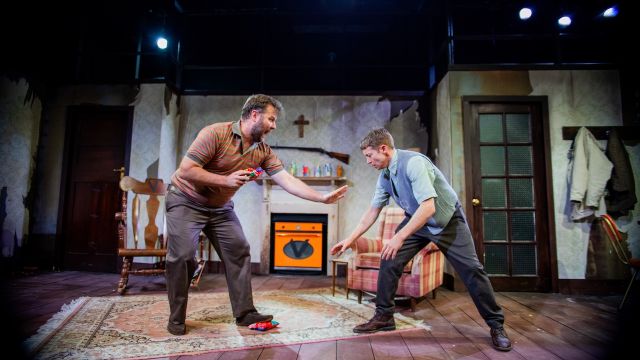The Lonesome West
The Ireland Martin McDonagh depicts in his two Irish trilogies is not a happy place, especially the town of Leenane in County Galway where The Beauty Queen of Leenane, A Skull in Connemara and The Lonesome West are set. Rather than the pretty images tourists see of cottages nestling on the northern edge of Killarney Harbour, the village McDonagh paints is a place of bleakness and dysfunction.
His characters are dissatisfied, angry, quick to take offence, often morally corrupt. And, though shockingly violent at times, in a ‘quare’ crazy Irish way, they are also funny.
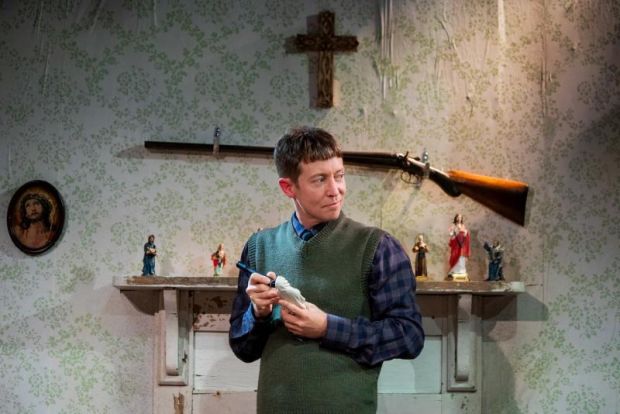
In The Lonesome West, it’s brothers who are the cause of tension, provoking each other brutally, fighting viciously even though they have just buried their father … whom the older brother, Coleman shot in the head. Everyone believes it was an accident, but it wasn’t …
“Getting your hairstyle insulted is no just cause to go murdering someone,” taunts his brother Valene, who has supported the ‘accident’ story in exchange for taking possession of everything left by their father. And just in case Coleman forgets, everything in the house is marked with a black “V” – even the fibreglass figurines which Valene collects religiously.
It is this ‘bone of contention’ that provides the friction. Valene provokes, Coleman reacts. Coleman ‘steals’ a drink, Valene reacts. Insults are thrown, tempers erupt, a fight begins. It’s sadistic, cruel, violent … but somehow, it’s funny! Black comedy makes us laugh at something that makes us feel uncomfortable.
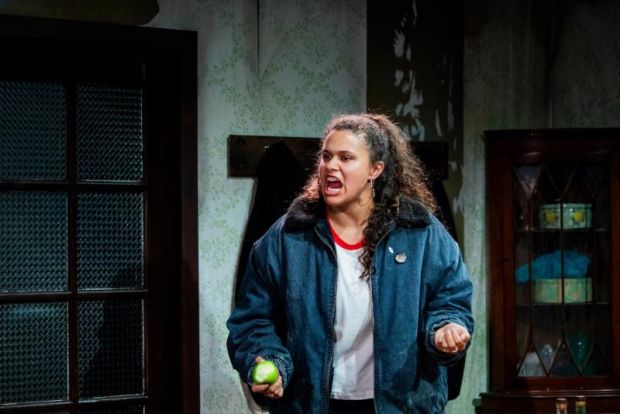
Anna Houston directs with this in mind. She follows the rhythms of McDonagh’s script, moments of quiet, followed by rising tension, culminating in fierce language and savage physicality – and some unforeseen shocks – all set in a sparsely furnished living room designed by Kate Beere. It is a dour, bleak room, with mismatched furniture, age-stained wallpaper coming away in patches, and a shelf of sacred statues watching over a gaping fireplace … that is intrinsic to the plot!
Houston skilfully manipulates the action in the space. distancing the brothers as the tension rises, then bringing them closer to circle each other, taunting, until they erupt – into fight scenes that are carefully choreographed and rehearsed and explicitly timed.
Plays such as this require detailed research into the motivation of the characters – and their accents, in order to achieve the inflections that are so recognisably Irish. Under the guidance of dialect coach Linda Nicholls Gidley, Houston’s cast find the cadence and rhythm – and the pace and diction needed for McDonagh’s idiomatic dialogue.
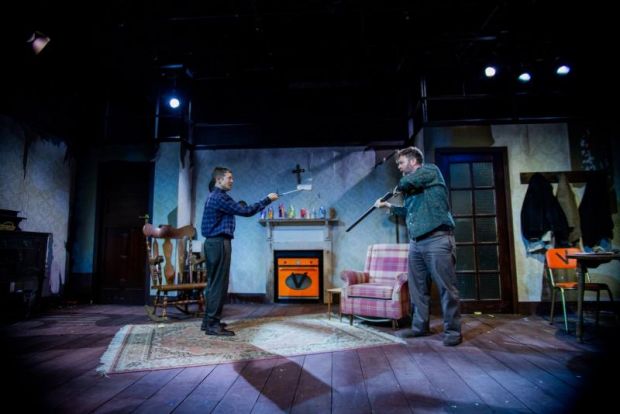
Lee Beckhurst as Coleman Connor is brooding and resentful, easily provoked, quick to take offence. He is wary, watchful and Beckhurst keeps him coiled, ready to spring, constantly aware of the hold his brother has over him, even as he steals his brother’s drink to share with the priest – or recalls memories with Girleen.
The Valene Connor that Andre de Vanny portrays is spiteful, scheming. Small and lithe, he almost skips around the stage, needling his brother, baiting him as he draws his black ‘V’ on yet another of his religious figures, or taunting him with the liquor he won’t share. He is a vindictive character, and de Vanny shows this in his gloating expressions and wild, cruel eyes.
Abe Mitchell plays Father Welsh - stuck in a parish fraught with suspicion and sinners – his frustration not helped by a drinking problem that his parishioners, especially the Connors, don’t let him forget. Mitchell shows the weakening faith of the character, even as he tries to support the brothers and deal with a local suicide.
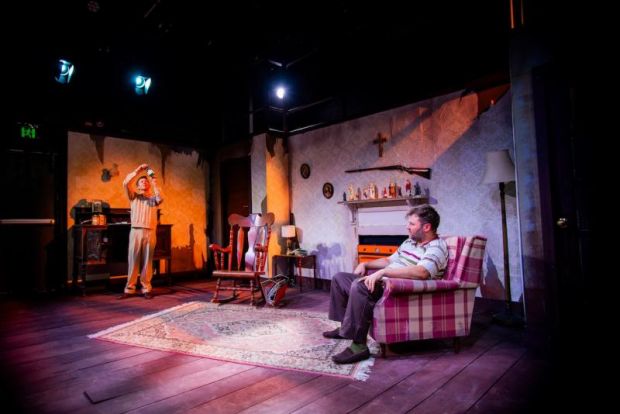
Ruby Henaway is Girleen - bright, cheerful, as settled as a young woman can be in a place where so much is unsettled. She values her friendships and is supportive of both the brothers and Father Welsh. This is particularly poignant in a scene in Act 2 when she sits with the priest beside a lake, watching the water and the night sky. Here McDonagh writes more lyrically, and though poignant, the scene leads to a less happy twist in the plot – another feature of black comedy.
Anna Houston’s production finds the pace and style of Martin McDonagh’s wicked humour, irony, crazed, wild characters and dramatic ‘surprises’. Her cast exposes the frustrations and frailties of the characters whilst still sustaining the level of energy that is vital to maintain the constant momentum of the production.
HSC Drama students studying Black Comedy should see this production and how it is staged – and McDonagh’s play The Lieutenant of Inishmore is one of the set texts!
Carol Wimmer
Photographer: Saz Watson
Subscribe to our E-Newsletter, buy our latest print edition or find a Performing Arts book at Book Nook.

